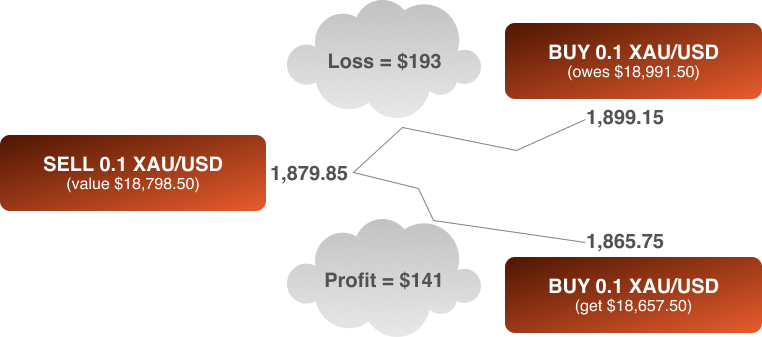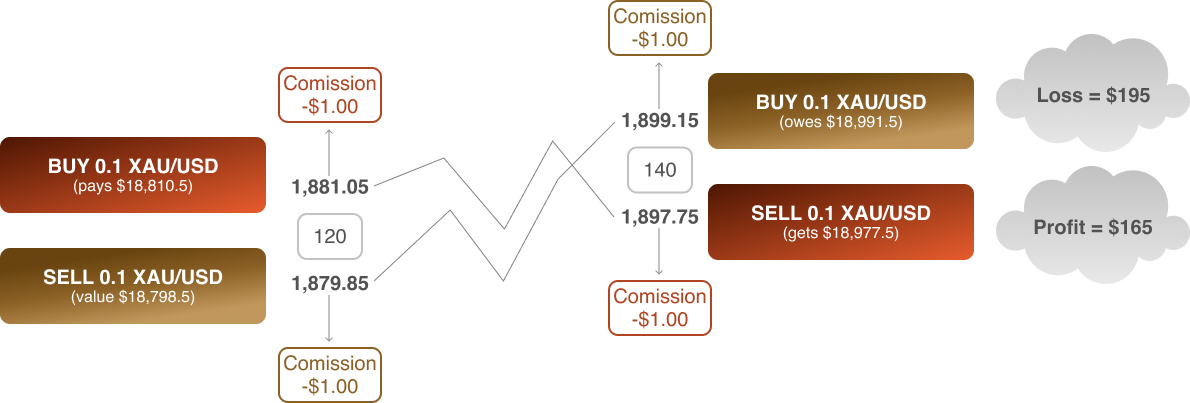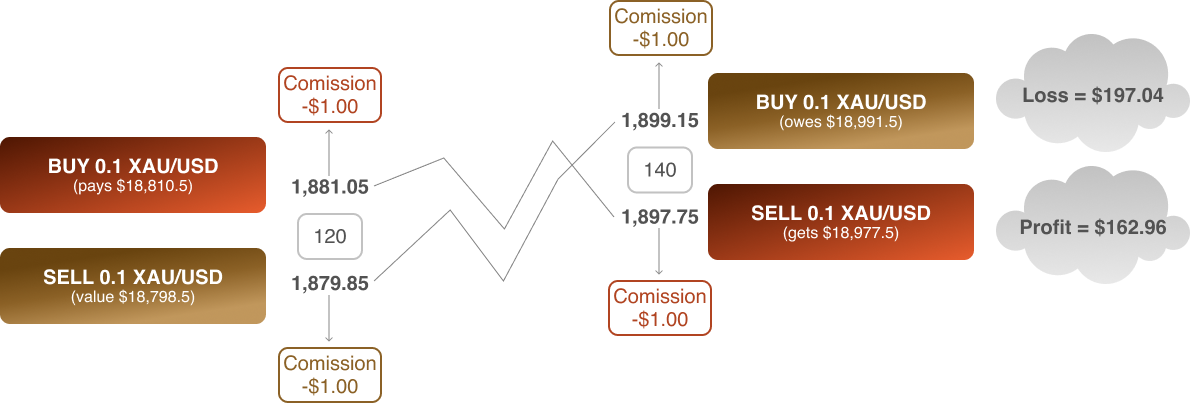Trade Gold CFDs
Trade Gold CFDs with Сaptainmarkets
When you open a CFD trading account with Сaptainmarkets, you can trade the world’s most popular precious and industrial metals, including luxurious gold.
Start trading Gold with Сaptainmarkets


About Gold
Throughout history, gold has played a vital role in shaping society, economy and industry. Even after the gold standard was abolished in 1971, gold continued to appreciate in the open market and increased in price far beyond its industrial value. Despite gold no longer having a role in monetary policy, central banks, commercial banks and governments continue to hoard the precious metal. Gold is used for producing jewellery, dentistry, manufacturing components for the technology industry, and investing.
The average investor likely purchases gold bullion coins or ingots from a local mint or dealer. Institutional investors likely go to a large exchange, such as the London Metal Exchange or the Chicago Mercantile Exchange. Trader’s looking to speculate on gold price over a short to medium timeframe may use CFDs.
Important Gold Discoveries
1718 – Ouro Preto, Brazil
Gold was discovered in the Portuguese colony of Brazil, which became the largest producer of gold by 1720, with nearly two-thirds of the world’s output. 800 metric tons of gold were sent to Portugal.
1799 – North Carolina, United States
A 17-pound gold nugget of gold is discovered in Cabarrus County, North Carolina. It was the first documented gold discovery in the United States and sparked the first US gold rush.
1848 – California, United States
Someone accidentally found gold flakes in Sacramento California while building a sawmill. Word soon travelled, and approximately 300,000 people migrated to California.
1850 – New South Wales, Australia
Edward Hargraves, a British sailor, travelled to California to participate in the California gold rush but missed out. He took his knowledge to Australia, where he discovered gold in New South Wales within one week of arriving.
1886 – Johannesburg, South Africa
George Harrison, while digging up stones to build a house, discovers gold in South Africa. Since then, the country has been the source of almost 40% of all gold ever mined.
1898 – Alaska, United States
Two gold prospectors discovered gold while fishing in Klondike, Alaska, spawning the century’s last gold rush.
Why trade Gold CFDs?
- CFDs make it convenient to get exposure to the gold market without physically buying and storing bouillon. Positions can be quickly liquidated at a fraction of the cost of trading physical coins.
- Adding gold to your trading strategy can introduce another dimension. Gold has a complicated relationship with the US dollar as it is priced in dollars but is uncorrelated with the currency.
XAU/USD CFD Specifications
The symbol for gold in the forex market is XAU. In other markets, it might be known under different symbols, such as GC. At Captainmarkets, we offer gold quoted against the US dollar. When you trade XAU/USD, the base asset is Gold, and the quote asset is US dollars. The standard contract size, often referred to as the Lot size is one-hundred troy ounces. Unlike a conventional ounce, which is 28 grams, a troy ounce is 31.1 grams. The smallest order size you can enter is 0.01 Lots, which is equal to one troy ounce.
XAU/USD is quoted with two decimal places. The second digit is known as the Pip. The value of a Pip depends on the size of the contract. If you open a position for 1 Lot of XAU/USD, the Pip value will be $10, whereas if you open a position for 0.01 Lots of XAU/USD, the Pip value would only be $0.10.
One of the benefits of CFD trading is you can use leverage to reduce how much capital required to open positions. Captainmarkets offers up to 1:20 leverage for trading XAU/USD, which means you only need to provide a 5% margin to open a position.
Leverage can be a useful tool when applied strategically. If you don’t take the proper cautions when trading with leverage, it can lead to greater losses.
- Base asset: Gold
- Quote asset: US dollars
- Contract size (Lot size): 100 Troy Ounces
- Min trade size: 1 Troy Oz (0.01 Lots)
- Max trade size: 10000 Troy Oz (100 Lots)
- Pip position: 0.01
- Pip value: $10
- Maximum leverage (margin): 1:20 (5%)
- Trading hours: 01:00 to 23:59
When you go short on XAU/USD, you’re theoretically selling gold for dollars. To close the position, another trade in the opposite direction is used to offset it. Your profit or loss will be calculated in dollars. If the price of gold decreases, you profit and are left with more dollars when you close the position. If gold strengthened, you’d get back fewer dollars.

With leverage, you can open larger positions than your capital would otherwise permit. When you trade CFDs with Captainmarkets, you can use leverage as high as 1:20; meaning you only need to provide margin to cover 5% of the position’s value.

When you trade CFDs, you don’t need to own either of the assets or currencies involved in the trade. For example, if your trading account balance is funded with euros, you can still trade XAU/USD. The purpose of a CFD is to allow traders to speculate on an asset’s price without having to purchase it or own it. When a CFD is closed, it will always be settled in cash either by increasing or decreasing your trading balance.


Costs to trade Gold
There are different costs associated with trading CFDs with Captainmarkets. There are three primary factors which influence how much it costs to trade CFDs; they are:
- The size of your trade, the bigger the trade, the higher the fees.
- The instrument you’re trading, as different products have different characteristics.
- The type of account you have, as different accounts have different conditions.
Costs related to trading CFDs
The different costs to be aware of when trading forex CFDs are spreads, commissions and swaps.
Spread
The spread is the difference between the bid and Ask-price. When you enter a long trade, your order is opened using the Ask-price, which is the higher of the two quotes. When the long trade is closed, the Bid-price, which is the lower of the two quotes. If the spread on XAU/USD is 120, it means the difference between the price you buy at, and the price you sell at is $1.20.

Commission
Commissions are charged when you open and close a trade and therefore impacts your profitability. In this example, the commission charged is $10 per Lot. Once adjusted according to the trade size of 0.1 Lots, the commission becomes $1.00 on each side of the trade.

Swap
A swap is a fee for holding positions overnight. The fee is derived from the interest rate differential between the base and quote asset. As DAX is not a currency, it is not subject to interest rates. Therefore the swap fee comes from the euro. In this example, the swap rate is €10.97 per Lot for both long and short positions. Swaps are charged at the end of the trading day for any positions rolled over to the following day.





